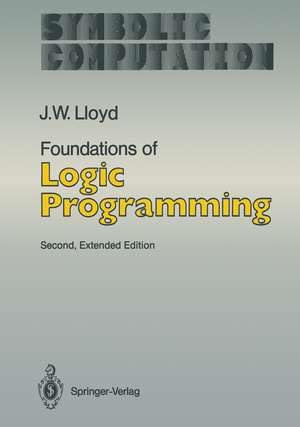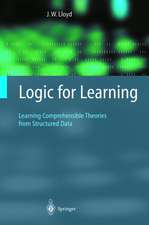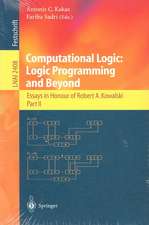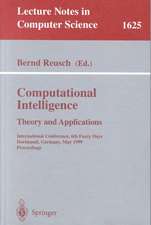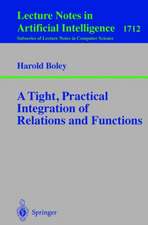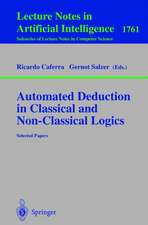Foundations of Logic Programming: Symbolic Computation
Autor John W. Lloyden Limba Engleză Paperback – 15 dec 2011
Din seria Symbolic Computation
- 20%
 Preț: 350.21 lei
Preț: 350.21 lei - 20%
 Preț: 651.89 lei
Preț: 651.89 lei - 20%
 Preț: 647.61 lei
Preț: 647.61 lei - 20%
 Preț: 649.09 lei
Preț: 649.09 lei - 20%
 Preț: 648.44 lei
Preț: 648.44 lei - 20%
 Preț: 639.35 lei
Preț: 639.35 lei - 20%
 Preț: 653.06 lei
Preț: 653.06 lei - 20%
 Preț: 642.19 lei
Preț: 642.19 lei - 20%
 Preț: 651.09 lei
Preț: 651.09 lei - 20%
 Preț: 659.97 lei
Preț: 659.97 lei - 20%
 Preț: 645.31 lei
Preț: 645.31 lei - 20%
 Preț: 648.44 lei
Preț: 648.44 lei - 20%
 Preț: 650.27 lei
Preț: 650.27 lei - 20%
 Preț: 646.47 lei
Preț: 646.47 lei -
 Preț: 394.29 lei
Preț: 394.29 lei - 20%
 Preț: 326.46 lei
Preț: 326.46 lei - 20%
 Preț: 342.28 lei
Preț: 342.28 lei - 20%
 Preț: 339.99 lei
Preț: 339.99 lei - 20%
 Preț: 641.01 lei
Preț: 641.01 lei - 20%
 Preț: 657.99 lei
Preț: 657.99 lei - 20%
 Preț: 648.26 lei
Preț: 648.26 lei - 20%
 Preț: 661.47 lei
Preț: 661.47 lei - 15%
 Preț: 638.89 lei
Preț: 638.89 lei - 20%
 Preț: 657.67 lei
Preț: 657.67 lei - 20%
 Preț: 652.73 lei
Preț: 652.73 lei - 20%
 Preț: 330.42 lei
Preț: 330.42 lei - 20%
 Preț: 709.98 lei
Preț: 709.98 lei - 20%
 Preț: 834.69 lei
Preț: 834.69 lei - 20%
 Preț: 656.03 lei
Preț: 656.03 lei - 20%
 Preț: 324.64 lei
Preț: 324.64 lei - 20%
 Preț: 355.67 lei
Preț: 355.67 lei - 20%
 Preț: 328.27 lei
Preț: 328.27 lei - 20%
 Preț: 330.24 lei
Preț: 330.24 lei - 20%
 Preț: 342.96 lei
Preț: 342.96 lei - 20%
 Preț: 555.53 lei
Preț: 555.53 lei
Preț: 757.48 lei
Preț vechi: 946.85 lei
-20% Nou
Puncte Express: 1136
Preț estimativ în valută:
144.95€ • 154.100$ • 120.85£
144.95€ • 154.100$ • 120.85£
Carte tipărită la comandă
Livrare economică 18 aprilie-02 mai
Preluare comenzi: 021 569.72.76
Specificații
ISBN-13: 9783642831911
ISBN-10: 3642831915
Pagini: 228
Ilustrații: XII, 212 p.
Dimensiuni: 170 x 244 x 12 mm
Greutate: 0.37 kg
Ediția:2nd ed. 1987. Softcover reprint of the original 2nd ed. 1987
Editura: Springer Berlin, Heidelberg
Colecția Springer
Seriile Symbolic Computation, Artificial Intelligence
Locul publicării:Berlin, Heidelberg, Germany
ISBN-10: 3642831915
Pagini: 228
Ilustrații: XII, 212 p.
Dimensiuni: 170 x 244 x 12 mm
Greutate: 0.37 kg
Ediția:2nd ed. 1987. Softcover reprint of the original 2nd ed. 1987
Editura: Springer Berlin, Heidelberg
Colecția Springer
Seriile Symbolic Computation, Artificial Intelligence
Locul publicării:Berlin, Heidelberg, Germany
Public țintă
ResearchCuprins
1. Preliminaries.- §1. Introduction.- §2. First Order Theories.- §3. Interpretations and Models.- §4. Unification.- §5. Fixpoints.- Problems for Chapter 1.- 2. Definite Programs.- §6. Declarative Semantics.- §7. Soundness of SLD-Resolution.- §8. Completeness of SLD-Resolution.- §9. Independence of the Computation Rule.- §10. SLD-Refutation Procedures.- §11. Cuts.- Problems for Chapter 2.- 3. Normal Programs.- §12. Negative Information.- §13. Finite Failure.- §14. Programming with the Completion.- §15. Soundness of SLDNF-Resolution.- §16. Completeness of SLDNF-Resolution.- Problems for Chapter 3.- 4. Programs.- §17. Introduction to Programs.- §18. SLDNF-Resolution for Programs.- §19. Declarative Error Diagnosis.- §20. Soundness and Completeness of the Diagnoser.- Problems for Chapter 4.- 5. Deductive Databases.- §21. Introduction to Deductive Databases.- §22. Soundness of Query Evaluation.- §23. Completeness of Query Evaluation.- §24. Integrity Constraints.- Problems for Chapter 5.- 6. Perpetual Processes.- §25. Complete Herbrand Interpretations.- §26. Properties of T’p.- §27. Semantics of Perpetual Processes.- Problems for Chapter 6.- References.- Notation.
